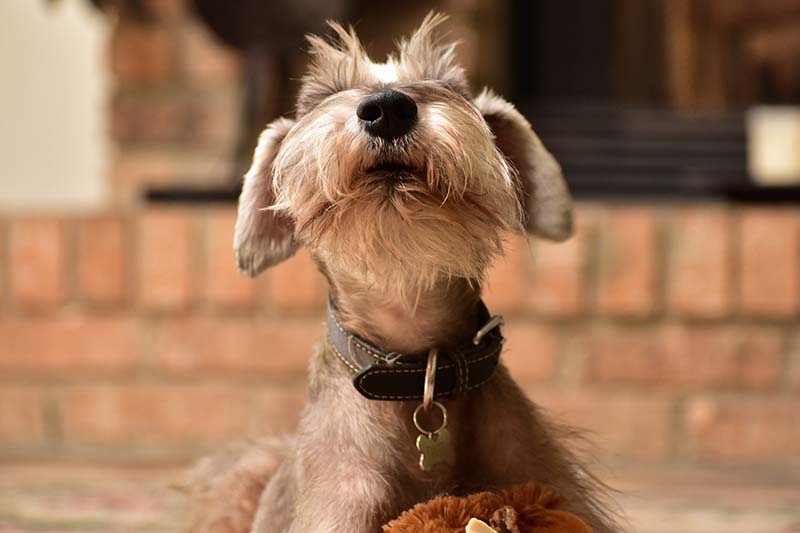Every breed of dog barks—except for the Basenji, which is a hunting dog with its roots in Africa. While barking is common in dogs, it’s not nice to listen to your dog bark excessively at all hours of the day and night. Incessant barking is a common complaint reported to local authorities and if you’ve ever lived by a dog that barks a lot, you know how annoying it can be.
A dog barks for a reason, even though it may not seem that way. If your dog is barking too much, you need to understand why. Some common causes of excessive barking include disturbances, excitement, boredom, anxiety, and attention-seeking. If you can pinpoint the reason why your dog is barking too much, you’ll be able to reduce it. Continue reading to learn more.
The 5 Reasons Dogs Bark Excessively:
1. Disturbances

Dogs are territorial by nature and bark to warn their pack of disturbances in their territory. While this type of barking is normal, it can be excessive if, for example, your dog constantly barks at people or other dogs he can see from your yard.
- Solution: To deal with this type of excessive barking, you’ve got to be on your toes. Whenever your dog barks excessively outside, immediately bring him indoors. If you’re consistent and always bring your dog inside when he’s doing too much barking, he will learn that he can’t be out unless he’s quiet.
2. Excitement

If your dog barks incessantly when he’s excited about something, he has to be taught that barking won’t help him get what he wants.
Some dogs tend to get excited and bark when they see other dogs. Therefore, it’s important to socialize your dog so they can learn to remain calm in the presence of other dogs.
- Solution: If your dog starts barking as soon as he sees you take out the leash for a walk, drop the leash on the floor, sit down, and wait for the barking to stop. You will have to repeat this many times until your dog understands that his barking won’t get him out the door any faster.
3. Boredom

Some dogs bark when they’re bored. If your dog approaches you and barks seemingly out of nowhere, he’s likely bored.
- Solution: This can be remedied by simply engaging with your dog. You can take your dog for a long walk, play a rousing game of fetch, or do some nose work with your beloved pooch.
4. Anxiety

Dogs often bark when they’re feeling anxious. In particular, a dog that is left alone could suffer from separation anxiety. If a dog has separation anxiety, he may bark incessantly and partake in destructive behavior like chewing on items and scratching at doors. He may also pace back and forth and pant.
- Addressing separation anxiety is best done by using what’s called counter-conditioning. This involves changing your dog’s emotional response toward being left alone to a calm and positive response.
- Counter conditioning is done through training. For example, you can prepare to leave your home by telling your dog to lay down in his bed and be a good boy. Then leave your home as you normally would. Exit, close, and lock the door then wait a couple of minutes to see if your dog is being quiet. If you don’t hear any barking, go back inside your home and praise your dog for being quiet.
- Continue this training over the course of a couple of weeks. Every day, leave your home and make the time you spend outside the door longer with each training session. This will teach your dog that he will be rewarded for being quiet regardless of how long he’s left alone.
When you are training your dog in this manner, don’t make a big deal over your return to the home so your dog doesn’t get over-excited. When you walk back into your home, simply tell your dog he’s been a good boy without fussing over him too much.
5. Attention-Seeking

If your dog is barking to get your attention, it’s important not to reward his demands by giving him the attention he wants.
- Solution: The best way to deal with attention-seeking barking is to ignore the behavior and wait for a few seconds of quiet. Once your dog stops barking, reward him with the attention he’s seeking. This will help your dog learn that he won’t get any attention from you when he demands it by barking.
Conclusion
If your dog is excessively barking, find out why. Once you’ve identified the cause of the barking, you’ll be able to deal with it effectively using the tips included here.
If you have an overly barky dog, do not yell at your dog, hit him, or use a shock collar. All these methods are ineffective and unkind. If you don’t have any luck stopping incessant barking, speak to your veterinarian for some help. Your vet may have some tips for you or he/she could recommend a dog behaviorist you could contact for help.
You may also want to know:
Featured Image Credit: sophiecat, Shutterstock











